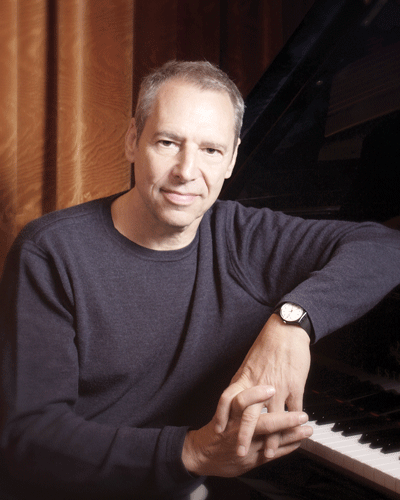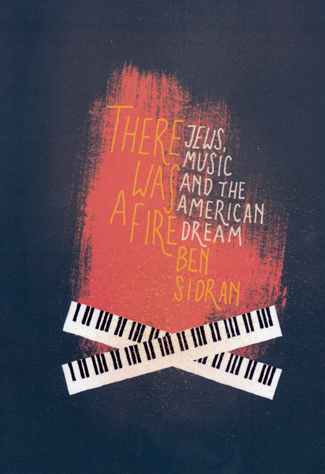By MORDECAI SPECKTOR
It’s hard to imagine American popular song without the contributions of Jewish composers and lyricists. Names like Irving Berlin, George and Ira Gershwin, Harold Arlen, E.Y. “Yip” Harburg, Jerome Kern, Richard Rodgers, Lorenz Hart, et al., figure prominently in the canon known as the Great American Songbook.
And then there’s Hibbing, Minn., native Bob Dylan, who penned some memorable ditties.
So, how did it happen that Jews attained such an outsize role in American popular music?
You have to go back to King David — “the first rock star,” according to Ben Sidran, a composer and jazz pianist, and author of the recently published book There Was a Fire: Jews, Music and the American Dream (Nardis Books).
In a phone interview last week from his home in Madison, Wisc., Sidran said that he had to go “all the way back” in the Tanach, the Hebrew Bible, to illustrate how the “Jewish narrative… the greatest story ever told” came to influence popular culture around the world.
Getting back to the biblical David, Sidran notes in his book that the story is “straight out of today’s pop mythology”: a “poor but magical boy out of the hinterlands whose music has the power to heal (think Johnny B. Goode)” and who plays the lyre — a “proto-guitar” — calms King Saul, slays Goliath and writes the Psalms (or most of them). “The Psalms were ‘hits’ when he wrote them and are still hits today. Millions and millions of people have recited David’s words over the years,” writes Sidran.

Sidran will expound on his theories about the Jewish narrative and its influence on popular music in a Sept. 9 cabaret-style show at the Dakota Jazz Club. Titled “Jews, Music and the American Dream,” the show will feature Sidran reading a bit from his book, telling stories and, of course, playing some of the songs written by the renowned Jewish songwriters. He will be backed by his longtime musical mates, Billy Peterson, on bass, and Gordy Knutson, drums.
There Was a Fire is jam-packed with amusing musical lore, which Sidran unspools in a decade by decade format. Early in the 20th century, Irving Berlin (né Israel Baline, from Russia) got a job in New York City as a “boomer,” belting out songs written by Harry Von Tilzer “on street corners, in pool halls, wherever crowds gathered.” (Von Tilzer’s younger brother, Albert, also was a composer, and wrote a song that everyone’s still singing, “Take Me Out to the Ballgame.”)
Berlin went on to become a music legend, writing classic songs for Broadway shows and Hollywood movies, including “White Christmas,” “Easter Parade,” “Blue Skies,” etc. He also wrote a patriotic song, which he kept in the “trunk” for 20 years, then finally released: “God Bless America,” which Kate Smith sang during her 1939 Armistice Day radio broadcast.
Also, Sidran writes that Berlin, with his song “Alexander’s Ragtime Band,” captured “something of the black American experience, on a vast commercial scale and in a way that whites, both in America and around the world, could understand and empathize with.”
Sidran’s book is full of surprising information, such as the fact that the great African-American stride pianist, Willie “The Lion” Smith, “just happened to be a self-identified Jew and a cantor in a Harlem synagogue.”
And regarding Harlem, Harold Arlen (né Chaim Arluch), from Buffalo, N.Y., moved to Manhattan at the age of 20, in 1925, and soon met the renowned black bandleader Fletcher Henderson. After hitting the charts with “Get Happy,” written with lyricist Ted Koehler, in 1930, Arlen “took his success up to Harlem, becoming the in-house composer for the Cotton Club revues,” Sidran writes. “[Arlen] loved spending his time uptown, listening to Duke Ellington, James P. Johnson, and Fats Waller” at the Cotton Club and other spots favored by vaudeville and Broadway show musicians.
Arlen, with Yip Harburg, later became even more famous for “Somewhere Over the Rainbow,” and other songs written for The Wizard of Oz.

As you might imagine, There Was a Fire devotes many pages to George Gershwin, whom Sidran calls “one of these cultural giants that come along every now and again.” Sidran breaks down Gershwin’s innovations in technical musical terms, which likely are beyond the ken of casual readers. However, going back to Irving Berlin, in his song “Blue Skies,” Sidran writes about how these songwriters employed the “Jewish move,” a shift from major to minor, which, among other things, “gave a place for traditional Jewish modes to cavort with the flatted ‘blue notes’ of Harlem.”
And Sidran points out that the “opening notes of Gershwin’s song ‘It Ain’t Necessarily So’ have been compared to the opening notes of the well-known Jewish prayer the Barchu…” This recalls local composer Joe Vass’ extremely clever and entertaining stage play, The Soul of Gershwin: The Musical Journey of an American Klezmer, which made the case for strong Jewish influences in Gershwin’s works.
In The Soul of Gershwin, the character of Gershwin onstage fishes out a piece of paper and reads a statement by jazz pianist Herbie Hancock: “There are only two basic forms in jazz: one of them is the blues, which was not written by any particular person but is a part of black culture, and the other one is ‘rhythm’ changes, and those were written by George Gershwin… Rhythm changes are really fundamental to the way jazz is improvised, and it’s really interesting that they were created by a single individual.”
“That’s really interesting,” says Sidran, about Hancock’s observation. He explains that “rhythm” changes are actually about the way that the music “moves harmonically.” He dissects George and Ira Gershwin’s song “I Got Rhythm,” which moves “through cycles that have become fundamental to jazz improvisation.”
The great Jewish composers could entertain the masses, and they also drew on our prophetic tradition, the “powerful narrative” of social justice. Sidran writes about songs like “Brother, Can You Spare a Dime,” Harburg and Jay Gorney’s vivid picture of Depression-era despair; and “Strange Fruit,” the controversial song about lynching in the South, written by Abel Meeropol, and performed most memorably by Billie Holiday.
Sidran also devotes dozens of pages to Bob Dylan, who came to prominence as the writer of social protest songs. The personality of the Bard of Hibbing and songwriting talent fascinate Sidran, whose last album, Dylan Different, features renditions of 12 Dylan songs.
There Was a Fire brings things up to the minute with brief mentions of Matisyahu, the Hip-Hop Hoodios, Socalled, John Zorn, et al.
Midway through our nearly hour-long phone chat, Sidran mentions, regarding how he came to write his most recent book (which includes his personal stories about the music business in the ’60s and ’70s, and some notable gonifs): “I’m not an academic… I love the stories; that’s my favorite part of the whole history of Jews and music and the American dream. I love the stories, and I love telling the stories.”
***
Ben Sidran will perform “Jews, Music and the American Dream” 7 p.m. Sunday, Sept. 9 at the Dakota Jazz Club and Restaurant, 1010 Nicollet Ave., Minneapolis. For tickets, call 612-332-1010, or go to: dakotacooks.com.
(American Jewish World, 8.31.12)




















Comments 0